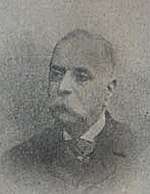Abdallah Marrash
| Abdallah Marrash | |
|---|---|
 | |
| Native name | عبد الله بن فتح الله بن نصر الله مرّاش |
| Born |
May 1839 Aleppo, Ottoman Syria |
| Died |
January 17, 1900 (aged 60) Marseille, France |
| Relatives |
Francis Marrash (brother) Maryana Marrash (sister) |
Abdallah bin Fathallah bin Nasrallah Marrash (Arabic: عبد الله بن فتح الله بن نصر الله مرّاش / ALA-LC: ‘Abd Allāh bin Fatḥ Allāh bin Naṣr Allāh Marrāsh; May 1839[1][lower-alpha 1] – January 17, 1900) was a Syrian writer involved in various Arabic-language newspaper ventures in London and Paris.
Life
Abdallah Marrash was born in Aleppo, a city of Ottoman Syria (present-day Syria), to an old Melkite family of merchants known for their literary interests.[3] Having earned wealth and standing in the 18th century, the family was well established in Aleppo,[4] although they had gone through troubles: a relative of Abdallah, Butrus Marrash, was martyred by Greek Orthodox fundamentalists in April 1818.[5] Other Melkite Catholics were exiled from Aleppo during the persecutions, among them the priest Jibrail Marrash.[6][lower-alpha 2] Abdallah's father, Fathallah, tried to defuse the Sectarian conflict by writing a treatise in 1849, in which he rejected the Filioque.[7] He had built up a large private library[8] to give his three children Francis, Abdallah and Maryana a thorough education, particularly in the field of Arabic language and literature.[9]
Aleppo was then a major intellectual center of the Ottoman Empire, featuring many thinkers and writers concerned with the future of the Arabs.[10] It was in the French missionary schools that the Marrash family learnt Arabic with French, and other foreign languages (Italian and English).[10] After studying in Aleppo, Abdallah went to Europe to pursue his studies while devoting himself to trade.[11]
Having established himself in Manchester by 1863,[12] he became a naturalized British subject in 1872.[13] He accessed the collections of Arabic manuscripts in London and Paris and copied what he thought was useful to his Middle Eastern compatriots.[11] In 1879, he helped Adib Ishaq found the Parisian journal Misr al-Qahirah.[14] Marrash founded Kawkab al-Mashriq (The Star of the Orient), a monthly Parisian Arabic-French bilingual journal, the first issue of which was published on June 23, 1882; it was ephemeral.[15] In 1882, Marrash settled down in Marseille, where he died on January 17, 1900.[13] He had been a member of the Société Asiatique.[16]
Notes
- ↑ The Court of Appeal of Aix provided the date of "May 14",[1] but did not disclose whether it corresponds to the Gregorian calendar or to the Julian calendar, which was used among the Melkites when Marrash was born.[2]
- ↑ Little is known about the lives of Butrus Marrash and Jibrail Marrash. Butrus was married by the time he was killed, and the name of his father was Nasrallah Marrash; Niqula al-Turk wrote a funeral ode for him.[5]
References
- 1 2 Griolet & Vergé (ed.), p. 76.
- ↑ Taft, p. 420.
- ↑ Wielandt, p. 119; Zeidan, p. 50.
- ↑ Wielandt, p. 119; Hafez, p. 274.
- 1 2 Wielandt, p. 120; Charon, p. 115.
- ↑ Charon, p. 115.
- ↑ Wielandt, p. 120.
- ↑ Zeidan, p. 50.
- ↑ Wielandt, p. 122; Bosworth, van Donzel, Lewis & Pellat (ed.), p. 598.
- 1 2 Bosworth, van Donzel, Lewis & Pellat (ed.), p. 598.
- 1 2 Annali, p. 285.
- ↑ Strakers' Annual Mercantile, Ship & Insurance Register, p. 78.
- 1 2 Griolet & Vergé (ed.), p. 77.
- ↑ Génériques, p. 121.
- ↑ Ayalon, p. 177.
- ↑ Journal asiatique.
Sources
- Annali (in Italian). Istituto Universitario Orientale. 1940.
- Ayalon, Ami (1987). Language and Change in the Arab Middle East: the Evolution of Modern Arabic Political Discourse. Oxford University Press. ISBN 978-0195041408.
- Bosworth, Clifford Edmund; van Donzel, Emeri; Lewis, Bernard; Pellat, Charles, ed. (1991). Encyclopaedia of Islam. Volume VI. Brill. ISBN 978-9004081123.
- Charon, Cyrille (1903). "L'Église Grecque Melchite Catholique. Chapitre VIII : persécutions d'Alep et de Damas (1817–1832)" (in French). Échos d'Orient. Volume VI.
- Griolet, Gaston; Vergé, Chales-Paul-Laurent, ed. (1905). Jurisprudence générale. Deuxième partie (in French). Dalloz.
- Génériques (1990). Presse et mémoire : France des étrangers, France des libertés (in French). Éditions de l'Atelier. ISBN 978-2908833003.
- Hafez, Sabry (1993). The Genesis of Arabic Narrative Discourse: a Study in the Sociology of Modern Arabic Literature. Saqi Books. ISBN 978-0863561498.
- Journal asiatique, ou recueil de mémoires, d'extraits et de notices relatifs à l'histoire, à la philosophie, aux langues et à la littérature des peuples orientaux (in French). Société asiatique. 1875.
- Strakers' Annual Mercantile, Ship & Insurance Register. S. Straker & Sons. 1862.
- Taft, Robert J. (2006). "Between east and west: the Eastern Catholic ('Uniate') churches". In Gilley, Sheridan; Stanley, Brian.The Cambridge History of Christianity. Volume VIII: World Christianities (c. 1815 – c. 1914). Cambridge University Press.
- Wielandt, Rotraud (1992). "Fransis Fathallah Marrashs Zugang zum Gedankengut der Aufklärung und der französischen Revolution" (in German). In van Gelder, Geert Jan; de Moor, Ed. The Middle East and Europe: Encounters and Exchanges. Rodopi Publishers. ISBN 978-9051833973.
- Zeidan, Joseph T. (1995). Arab Women Novelists: the Formative Years and Beyond. State University of New York Press. ISBN 978-0791421727.